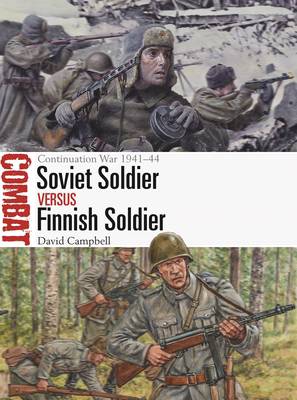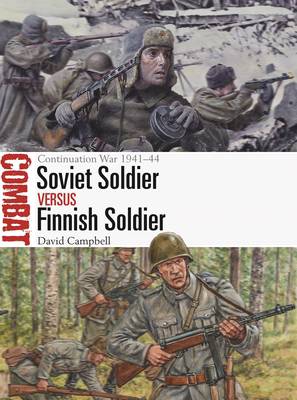
Bedankt voor het vertrouwen het afgelopen jaar! Om jou te bedanken bieden we GRATIS verzending (in België) aan op alles gedurende de hele maand januari.
- Afhalen na 1 uur in een winkel met voorraad
- Gratis thuislevering in België
- Ruim aanbod met 7 miljoen producten
Bedankt voor het vertrouwen het afgelopen jaar! Om jou te bedanken bieden we GRATIS verzending (in België) aan op alles gedurende de hele maand januari.
- Afhalen na 1 uur in een winkel met voorraad
- Gratis thuislevering in België
- Ruim aanbod met 7 miljoen producten
Zoeken
Omschrijving
In June 1941, Finnish troops invaded the Soviet Union alongside the forces of Nazi Germany, sparking a bitter three-year conflict. This absorbing study examines the composition, tactics, and training of both sides.
In a bid to recapture territory conceded following the Winter War of 1939--40, Finnish forces cooperated with Nazi Germany and other Axis powers during the invasion of the Soviet Union in June 1941. Rapid Finnish progress in reoccupying lost ground in Karelia during the first few months of the invasion gave way to a more static form of warfare from October 1941. The Finns resisted German pressure to participate fully in the Axis attack on the beleaguered Soviet-held city of Leningrad, and the Continuation War came to be characterized by trench warfare and unconventional operations conducted by both sides behind the front lines. In June 1944 the stalemate was abruptly ended by a massive Soviet offensive that pushed the Finns back; the two sides clashed in a series of major battles, including the battle of Tali-Ihantala, with the Finns halting the Soviet advance before agreeing to an armistice that September. The evolving military situation in this sector of the Eastern Front meant that the soldiers of the Soviet Union and Finland fought one another in a variety of challenging settings, prompting both sides to innovate as new technologies reached the front line. In this study, the doctrine, training, equipment, and organization of both sides' fighting men are assessed and compared, followed by a detailed assessment of their combat records in three key battles of the Continuation War.Specificaties
Betrokkenen
- Auteur(s):
- Illustrator(s):
- Uitgeverij:
Inhoud
- Aantal bladzijden:
- 80
- Taal:
- Engels
- Reeks:
- Reeksnummer:
- nr. 49
Eigenschappen
- Productcode (EAN):
- 9781472838308
- Verschijningsdatum:
- 18/08/2020
- Uitvoering:
- Paperback
- Formaat:
- Trade paperback (VS)
- Afmetingen:
- 183 mm x 246 mm
- Gewicht:
- 272 g

Alleen bij Standaard Boekhandel
+ 39 punten op je klantenkaart van Standaard Boekhandel
Beoordelingen
We publiceren alleen reviews die voldoen aan de voorwaarden voor reviews. Bekijk onze voorwaarden voor reviews.












